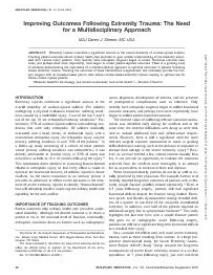Improving Outcomes Following Extremity Trauma : The Need for a Multidisciplinary Approach
Extremity injuries contribute a significant amount to the overall disability of combat-injured soldiers. Tracking patient outcomes allows military health care providers to gain a better understanding of the disability associated with various injury patterns. Only recently have orthopedic surgeons begun to collect functional outcome measures, and perhaps even more importantly, have begun to collect patient-reported outcomes. There is a growing body of evidence demonstrating the importance of a multidisciplinary approach to optimize outcomes in patients following severe extremity trauma. Tracking the outcomes of these interventions longitudinally will ultimately provide the military surgeon with an evidence-based plan to treat severe combat-related extremity injuries, leading to optimal care for future combat injured patients.
“However beautiful the strategy, you should occasionally look at the results.”—Winston Churchill
Geachte bezoeker,
De informatie die u nu opvraagt, kan door psychotraumanet niet aan u worden getoond. Dit kan verschillende redenen hebben,
waarvan (bescherming van het) auteursrecht de meeste voorkomende is. Wanneer het mogelijk is om u door te verwijzen naar de bron
van deze informatie, dan ziet u hier onder een link naar die plek.
Als er geen link staat, kunt u contact opnemen met de bibliotheek,
die u verder op weg kan helpen.
Met vriendelijke groet,
Het psychotraumanet-team.
In: Military Medicine, ISSN 0026-4075 | 181 | S4 | November | 26-29
http://dx.doi.org/10.7205/MILMED-D-15-00511


